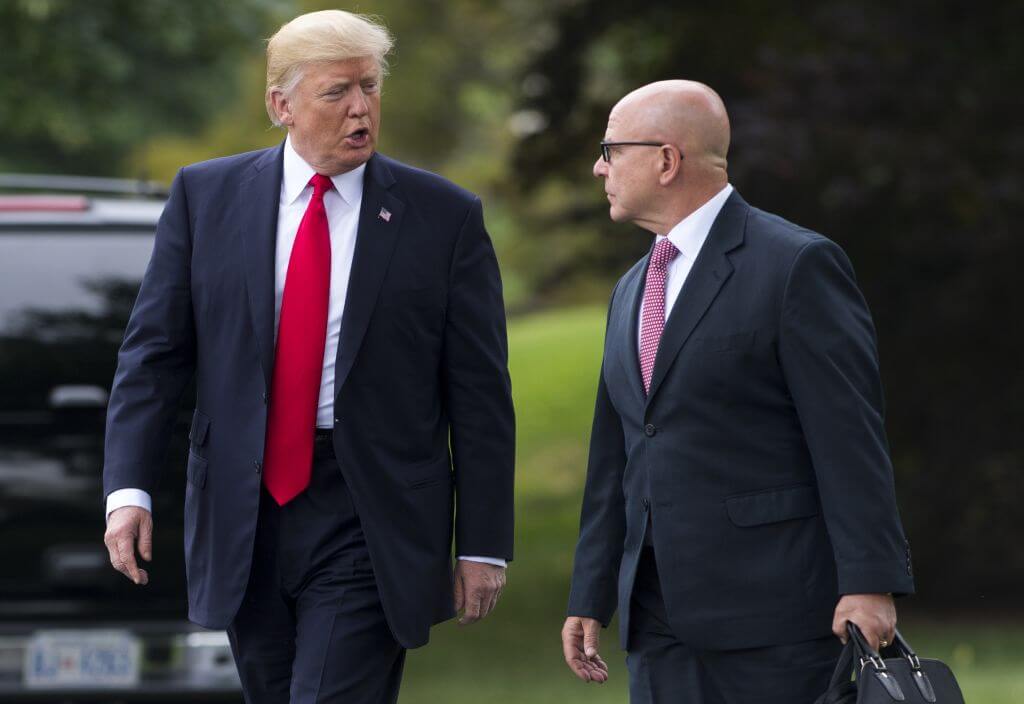Trump planned to announce Jerusalem embassy move months earlier than he did, new book reveals
Former national security adviser H. R. McMaster described Netanyahu’s optimistic view of Putin’s intentions as ‘delusional’

Former President Donald Trump at Yad Vashem on May 23, 2017. Photo by DEBBIE HILL/POOL/AFP via Getty Images
Former President Donald Trump was set to announce the relocation of the U.S. Embassy from Tel Aviv to Jerusalem during his 2017 visit to Israel, but postponed the decision after a discussion with his national security adviser, according to a new book.
Trump and his allies highlight the embassy move, along with other shifts in U.S. policy on Israel, as key achievements in their outreach to Jewish voters.
Lt. General (ret.) H.R. McMaster, who served as Trump’s national security adviser during the first year of his presidency, reveals in a new book, At War With Ourselves: My Tour of Duty in the Trump White House, that he convinced Trump not to announce the move during a speech at the Yad Vashem Holocaust museum. The book is slated for publication on Tuesday.
McMaster, who accompanied Trump on the May 2017 trip to Israel — which followed a visit to Saudi Arabia, Trump’s first foreign trip of his presidency — wrote that he learned from senior adviser Stephen Miller, who helped draft Trump’s speeches in Israel, that the president had planned to include the embassy announcement in his Yad Vashem remarks. McMaster urged Trump to reconsider, suggesting that the decision be discussed with the cabinet to allow the White House time to maximize the benefits and minimize any potential fallout.
Trump agreed, saying, “Okay, General, you can take it out of the speech.”
Sheldon Adelson, who was the largest single donor for Trump in the 2016 presidential election and who died in 2021, had demanded that Trump announce the relocation of the embassy when he was elected president and assured Trump in several meetings that the nightmare scenarios were “overblown.”
Although Trump signed a six-month waiver in May 2017 to delay the embassy move, as advised by then-Secretary of State Rex Tillerson, he revisited the issue in November. During a White House meeting before a December deadline, Tillerson again recommended signing a waiver to further delay a decision, but Trump had already made up his mind. On December 6, he announced the decision to move the embassy to Jerusalem.
On the May 2017 Israel trip, Trump met with both Israeli Prime Minister Benjamin Netanyahu and Palestinian Authority President Mahmoud Abbas. Trump complained to then-Israeli President Reuven Rivlin that “Bibi doesn’t want peace,” according to Netanyahu’s recent memoir.
“He was not wrong,” McMaster wrote, but added that those were “legitimate concerns” by Netanyahu about the viability of a two-state solution. The Oct. 7 attack by Hamas, McMaster said, “revealed” that the viability of two states depends on ensuring terror groups don’t seize the territories Israel has withdrawn from.
McMaster said that in the 13 months he served as national security adviser, he faced a smear campaign by far-right media personalities, accusing him of being hostile to Israel. He also blamed a Russian-sponsored social media effort to get him fired. McMaster resigned in March 2018.
What McMaster thought of Netnayahu’s embrace of Putin

In the book, McMaster recalled conversations with Israeli decision-makers, cautioning them about “falling for Putin’s subterfuge” in their strengthening of ties with the Russian president to stop Iran from gaining a foothold in the region. Netanyahu touted his warm relations with Putin during his reelection bid in 2019.
“Putin poured fuel on the flames of war and supported the murderous Assad regime while whispering to Israeli and Arab leaders that he promised to, over time, help diminish the influence of Iran in a post-civil war Syria,” McMaster wrote. “Putin would never cut Iran out, and Assad would never let the Iranians go.”
McMaster recounted a private conversation he had with Netanyahu at the annual Munich Security Conference in 2018, in which he voiced his concerns about Israel’s “hedging approach” to Russia. “Prime Minister, you know that Putin is using a bait and switch — baiting you with the promise to curtail Iran’s presence and influence in Syria while actually enabling Iran’s proxies on your borders,” McMaster said he told the Israeli premier, who came to sit next to him to discuss Hezbollah threats ahead of Netanyahu’s keynote address.
“Netanyahu smiled and said he had better return to his seat,” McMaster wrote.
McMaster called Netanyahu’s positive views of Putin’s intentions “delusional,” a perspective he believes Netanyahu abandoned after the Oct. 7 attacks. Putin didn’t immediately condemn the assault on Israel, hosted Hamas leaders in Moscow and criticized the war in Gaza.















